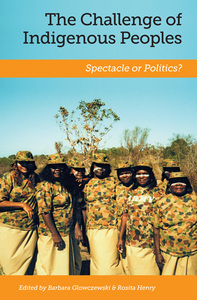Creative networks: the poetic politics of indigeneity
Henry, Rosita (2011) Creative networks: the poetic politics of indigeneity. In: Glowczewski, Barbara, and Henry, Rosita, (eds.) The Challenge of Indigenous Peoples: spectacle or politics? The Bardwell Press, Oxford, UK, pp. 245-256.
![[img]](https://researchonline.jcu.edu.au/23625/8.hassmallThumbnailVersion/21908_23624_23625_26913_Glowczewski_and_Henry_2011_Book_cover.jpg)
|
Image (JPEG) (Book Cover)
- Cover Image
Download (157kB) |
|
|
PDF (Published Version)
- Published Version
Restricted to Repository staff only |
Abstract
[Extract] Political action and artistic expression, as the ethnographic case studies in this book reveal, are closely interrelated social phenomena. Both entail the performance of actors who depend upon the presence of others as the very condition of their existence. We have examined various strategies employed by Indigenous peoples, individually and collectively, to create networks of connection and to harness to their causes the presence and political engagement of others, whether they be Indigenous or otherwise. Several chapters address issues that arise in "post-colonial" situations regarding the politics of cultural performances with the aim of tracing the field of power relations in which contemporary assertions of indigeneity are embedded. The authors investigate the significance of different expressive cultural forms in the contemporary representation and exchange of knowledge and the communication of Indigenous rights discourse. These case studies on practices and performances of indigeneity collectively reveal how differences continue to be engendered, and even flourish, in the context of the globalising forces that actively seek to encompass them (Castells 1997; Friedman 1994; Kupiainen et al 2004). The cultural responses and strategies employed by Indigenous Australians, Pacific Islanders and other peoples, such as the Adivasi of India or the Khanty of Siberia, provide important insights concerning the nature and value of social networks. Manuel Castells (2000) has written about the "rise of the network society" in the postmodern era. Yet, the concept is not so new to peoples who have historically been well versed in cultural practices based on flows of social exchange and cultural connection (cf. Glowczewski 2002; Hau'ofa 1994; Hess 2004; Lockwood 2004). Their performative emphasis on relatedness and principles such as autonomy, balance and reciprocity, offers a framework for fragmenting the destructive nationalisms and fundamentalisms that continue to threaten our world.
| Item ID: | 23625 |
|---|---|
| Item Type: | Book Chapter (Later Edition) |
| ISBN: | 978-1-905622-26-9 |
| Keywords: | Indigenous; indigeneity; cultural identity |
| Related URLs: | |
| Date Deposited: | 16 May 2013 23:01 |
| FoR Codes: | 16 STUDIES IN HUMAN SOCIETY > 1601 Anthropology > 160104 Social and Cultural Anthropology @ 100% |
| SEO Codes: | 95 CULTURAL UNDERSTANDING > 9599 Other Cultural Understanding > 959999 Cultural Understanding not elsewhere classified @ 100% |
| Downloads: |
Total: 774 Last 12 Months: 1 |
| More Statistics |



